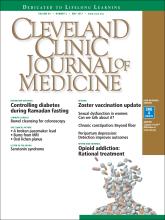Article Figures & Data
Tables
- TABLE 1
Risk of complications during Ramadan fasting: International Diabetes Federation categories
Category 1: very high risk One or more of the following: Severe hypoglycemia within the 3 months before Ramadan
Diabetic ketoacidosis within the 3 months before
Ramadan
Hyperosmolar hyperglycemic coma within the 3 months before Ramadan
History of recurrent hypoglycemia
History of hypoglycemia unawareness
Poorly controlled type 1 diabetes
Acute illness
Pregnancy with preexisting diabetes, or gestational diabetes treated with insulin or a sulfonylurea
Chronic dialysis or stage 4 or 5 chronic kidney disease
Advanced macrovascular complications
Old age with ill health
Category 2: high risk One or more of the following: Type 2 diabetes with sustained poor glycemic control
Well-controlled type 1 diabetes
Well-controlled type 2 diabetes on multiple-dose insulin or mixed insulin
Pregnancy with type 2 diabetes or gestational diabetes controlled with diet only or with metformin
Stage 3 chronic kidney disease
Stable macrovascular complications
Comorbid conditions that present additional risk factors
Diabetes and intense physical activity
Treatment with drugs that may affect cognitive function
Category 3: moderate/low risk Well-controlled type 2 diabetes treated with one or more of the following: Lifestyle therapy
Metformin
Acarbose
Thiazolidinediones
Second-generation sulfonylurea
Incretin-based therapy
Sodium-glucose cotransporter 2 inhibitor
Basal insulin
Adapted with permission from International Diabetes Federation and the DAR International Alliance. Diabetes and Ramadan: Practical Guidelines. Brussels, Belgium: International Diabetes Federation, 2016. www.idf.org/guidelines/diabetes-in-ramadan and www.daralliance.org.
Generally exempted from fasting:
Children
Elderly people
People with acute illness
Pregnant women
Developmentally disabled people (with serious physical handicaps, intellectual disability)
People with chronic illness with multiple complications
People who must travel long distances dailyDiabetes-related exemptions from fasting:
Type 1 diabetes
Type 2 diabetes with unstable disease
Complications of diabetes
Pregnancy and diabetes
Older age with diabetesBreaking the fast is recommended in the following cases: If blood glucose < 3.3 mmol/L (60 mg/dL) or symptoms of hypoglycemia
If blood glucose > 16.7 mmol/L (300 mg/dL)
If blood glucose < 3.9 mmol/L (70 mg/dL) in the morning, if patient is already on insulin or a sulfonylurea
Medication Recommendations Metformin Risk of hypoglycemia is low, so usually no dosage modification required
Split the dose: one-third predawn, the rest at sunsetSulfonylurea High risk of hypoglycemia
Glimepiride, gliclazide, and glipizide are preferred over conventional sulfonylureas such as glibenclamide because of comparatively fewer hypoglycemic eventsThiazolidinedione Risk of hypoglycemia is low, so usually no dosage modification required
If taken with other antidiabetic drugs, take one-fourth of the dose predawn, the rest at sunsetAlpha glucosidase inhibitor Risk of hypoglycemia is low
Gastrointestinal side effects can be problematicNonsulfonylurea secretagogues (glinides) Low risk of hypoglycemia, so no adjustment required for twice-daily dosing
Because of faster onset and shorter duration of action, nateglinide is preferred over repaglinide during Ramadan fasting as the risk of fasting hypoglycemia is lowGlucagon-like peptide 1 receptor agonist Risk of hypoglycemia is low, so no dosage modification required if taken alone
If taken with sulfonylurea, dose reduction requiredDipeptidyl peptidase 4 inhibitor Risk of hypoglycemia is low, so no dosage modification required Sodium-glucose cotransporter 2 inhibitor Avoid during Ramadan fasting due to risk of osmotic diuresis, dehydration, and ketoacidosis Insulin High risk of hypoglycemia
Premixed 70/30 insulin during Ramadan fasting more likely to cause hypoglycemic episodes than premixed 50/50
Usual morning dose at sunset, and half of nighttime dose predawn
Insulin analogues are associated with a lower risk of hypoglycemia than human insulin
Reduce dose of long-acting insulin analogues by 20%
During Ramadan fasting, a basal bolus regimen is preferred, including a long-acting basal insulin (eg, glargine, detemir, degludec) with a short-acting insulin (eg, glulisine, aspart, lispro) before meals






